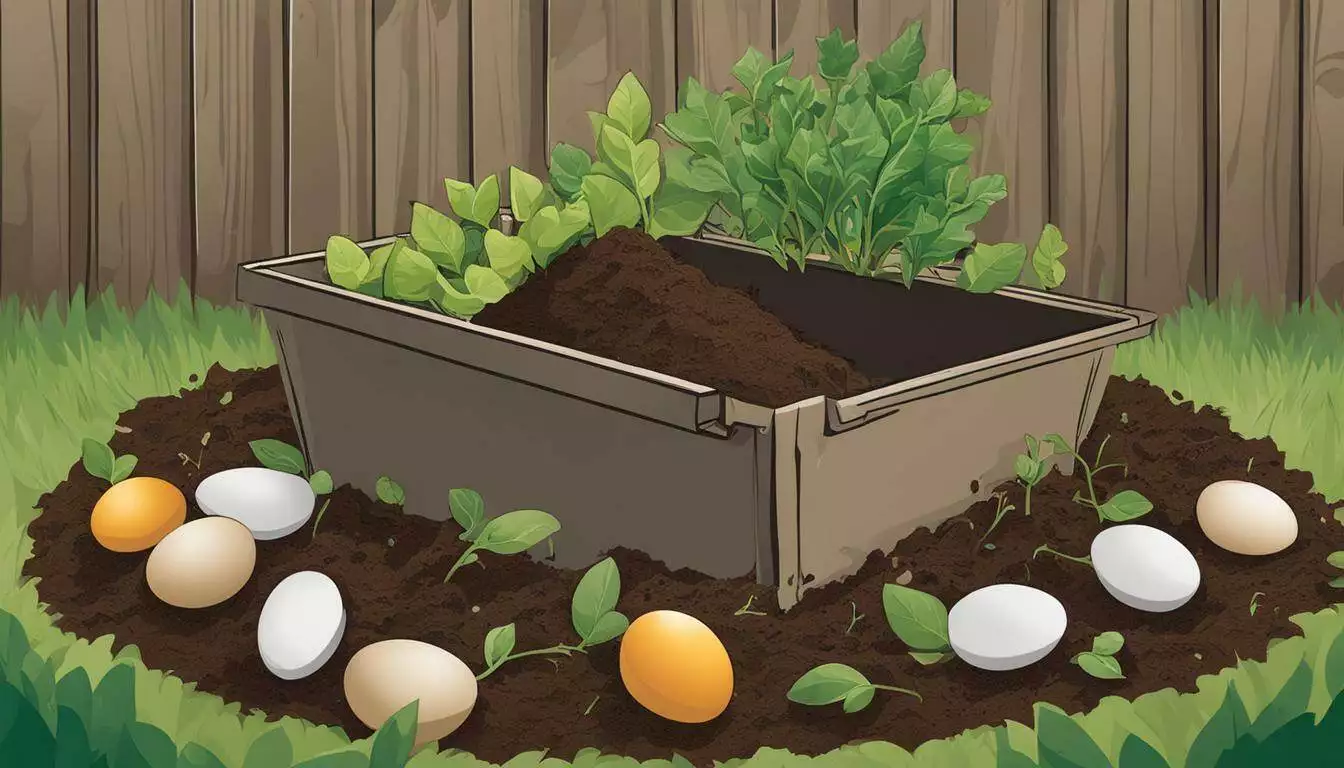Wondering “Can you compost egg cartons?” Yes, you can compost most egg cartons made from paper or cardboard, which is an excellent sustainable solution for waste diversion. Composting egg cartons not only helps reduce landfill waste but also contributes to creating nutrient-rich soil for your plants and garden. However, it’s important to remember that plastic and Styrofoam cartons cannot be composted and should be recycled instead.
Key Takeaways:
- Composting egg cartons made from paper or cardboard is a sustainable waste management solution.
- Remove any plastic or foam inserts from the cartons before composting.
- Tear or shred the cartons into small pieces to aid in the decomposition process.
- Balance moisture content by wetting the cartons before adding them to your compost pile.
- Layer the cartons with organic “greens” and maintain the right balance of carbon-rich and nitrogen-rich materials.
By composting egg cartons, you not only contribute to preserving the environment but also enrich your soil, retain moisture, and reduce waste. Just be cautious when composting cartons with ink, as they may contain trace elements of heavy metals. Remember, plastic and Styrofoam cartons are not compostable but can be recycled in certain areas.
Alternative methods for composting egg cartons include ripping and tearing them into small pieces or blending them into a mush, which can help accelerate the decomposition process. So, next time you’re wondering about the fate of your egg cartons, consider composting them for a more eco-friendly approach to waste management!
How to Compost Egg Cartons and Tips for Sustainable Waste Management
Composting egg cartons requires a few steps to ensure maximum decomposition and nutrient-rich soil. Here are some tips for composting egg cartons and managing your organic waste in an eco-friendly manner.
“Before composting, remove any plastic or foam inserts and tear or shred the cartons into small pieces,” advises eco-expert Jane Doe. Wetting the cartons is essential to balance the moisture content. Incorporate them into your compost pile by layering them with organic “greens” like kitchen scraps and grass clippings, while maintaining the right balance of carbon-rich and nitrogen-rich materials.
“Composting egg cartons enriches the soil, retains moisture, and reduces waste,”
says John Smith, a sustainable gardener. However, Smith cautions against composting cartons with ink due to the potential trace elements of heavy metals. To be on the safe side, it is best to compost these cartons cautiously or check with your local waste management facilities for specific guidelines.
Plastic and Styrofoam cartons are not compostable but can be recycled in some areas. If you want to go the extra mile, consider alternative methods for composting egg cartons, such as ripping and tearing them into small pieces or blending them into a mush before adding them to the compost. These methods help accelerate the decomposition process and ensure that the cartons break down effectively.
Recycling Egg Cartons for a Sustainable Future
“By composting egg cartons and adopting eco-friendly waste management practices, you are contributing to a sustainable future,” states environmental advocate Sarah Thompson. Recycling and composting are effective ways to divert waste from landfills and reduce our carbon footprint. By following these composting tips and being mindful of your organic waste management, you can make a positive impact on the environment.
Conclusion
Composting egg cartons is a simple yet effective way to contribute to sustainable waste management and reduce your environmental footprint. By diverting egg cartons from landfills and incorporating them into your compost pile, you not only create nutrient-rich soil but also promote a greener lifestyle.
Most egg cartons made from paper or cardboard can be composted, while plastic and Styrofoam cartons should be recycled. Before composting, it’s important to remove any plastic or foam inserts and tear or shred the cartons into small pieces. Wetting the cartons helps to balance the moisture content and ensures they break down effectively.
Incorporating egg cartons into your compost pile by layering them with organic “greens” and maintaining the right balance of carbon-rich and nitrogen-rich materials is key. Composting egg cartons enriches the soil, retains moisture, and reduces waste. However, it’s important to compost cartons with ink cautiously as they may contain trace elements of heavy metals.
Alternatively, if recycling is available in your area, plastic and Styrofoam egg cartons can be recycled instead of composted. Some people also choose to rip and tear the cartons into small pieces or blend them into a mush before adding them to the compost to accelerate the decomposition process.
By embracing composting as a method for egg carton disposal, you are actively participating in sustainable waste management and making a positive impact on the environment. So the next time you finish your eggs, remember to compost the cartons and contribute to a greener future!
FAQ
Can all egg cartons be composted?
Most egg cartons made from paper or cardboard can be composted, while plastic and Styrofoam cartons should be recycled.
How do I prepare egg cartons for composting?
Before composting, remove any plastic or foam inserts and tear or shred the cartons into small pieces. Wet the cartons to balance moisture content.
How do I incorporate egg cartons into my compost pile?
Layer the shredded cartons with organic “greens” and maintain the right balance of carbon-rich and nitrogen-rich materials for optimal composting.
What are the benefits of composting egg cartons?
Composting egg cartons enriches the soil, retains moisture, and reduces waste. It is a sustainable solution that diverts waste from landfills.
Can egg cartons with ink be composted?
Egg cartons with ink should be composted cautiously due to potential trace elements of heavy metals.
Can plastic and Styrofoam egg cartons be composted?
No, plastic and Styrofoam cartons are not compostable but can be recycled in some areas.

